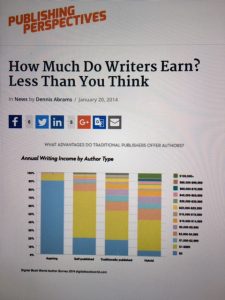If you aren’t writing to put food on the table, you’re writing to feed your soul. And if you are writing to put food on the table, you are likely on a starvation diet!
As you can see from the blue and yellow bars on the graph, the vast majority of writers report earning less than $1000 a year. So what’s in it for us?
From college till I left paid employment thirty years later—excepting the occasional lines of private poetry—I wrote only academic articles and research reports. When no longer employed, with no title and no built-in social network, I found myself lost. And depressed. That’s when I started writing Dark Harbor. Mysteries had been my favorite escapist reading, so of course I could write one! I quickly realized I had no idea what I was doing and enrolled in a writing class at the VMFA Studio School. And here I am, three books and more than fifty short stories later, still writing.
So why write? Because it’s good for you! In the February 10, 2017, Writers Digest published “11 Reasons Writing is Good for Your Health” by Baihley Grandison. According to Grandison, there are 11 science-backed ways writing improves your mind, body and spirit. Read the whole article, but in the meantime, here are the topics covered:
- Communicate better
- Be smarter
- Achieve goals
- Increase memory capacity
- Boost job prospects
- Healthier immune system
- Reduce blood pressure
- Improve lung function
- Boost athletic performance
- Heal traumatic and upsetting experiences
- Gratitude
Writer’s Digest isn’t the only source of such assertions. As far back as this Huffington Post article from 11/12/2013, Amanda L. Chan extolled the virtues of writing by hand to better retain information and build motor memory. Other benefits of writing listed were:
- Expressing emotions through words may speed healing
- Consider it a fundamental part of your gratitude practice
- Writing what you’re thankful for could help you sleep better
- It makes your mind—and body—better
- It could help cancer patients think about their disease
My own experience with breast cancer and its treatment gave rise to three publications: a magical realism piece, “Beast and the Beauty”; a memoir titled “Hindsight” about altering my view of my mother’s invalidism; and a newspaper essay titled “Repair or Redecorate After Breast Cancer.”
Jordon Rosenfeld cited ten reasons for writers to keep writing regardless of publication or income. Rosenfeld encouraged sharing his post, so here’s his list:
- Creativity has been proven to have positive effects on health, self-esteem and vitality
- Writing is good for your brain, creates a state similar to meditation
- Writing hones your powers of observation, giving you a fuller experience of life
- Writing hones your powers of concentration and attention, which is more fractured than ever thanks to technology and TV
- Writing connects you with others through blogging, writing groups, live readings, and self-publishing outlets like Scribd and Smashwords
- Through writing we preserve stories and memories that may otherwise be lost
- Writing entertains you and others, and having fun is an important part of good health
- Writing strengthens your imagination, and imagination is key to feeling hope and joy
- Writing helps heal and process wounds and grief, clearing them out
- Life is too short not to do what you enjoy
Why do I write? It keeps my brain sharp. I learn new things when researching stories—everything from the effects of ketamine on humans to the price of gasoline in 1930 to the characteristics of Buff Orpington hens. I understand myself better in relation to my family. I meet interesting people. (I’ve never met a boring writer!) My journal helps me keep track of personal events, thoughts, and trivia. Publishing—even without much financial reward—is good for my self-esteem. And now that I am a writer, I no longer define myself by what I used to be—as in, “I’m a retired academic.”
Why do you write?



